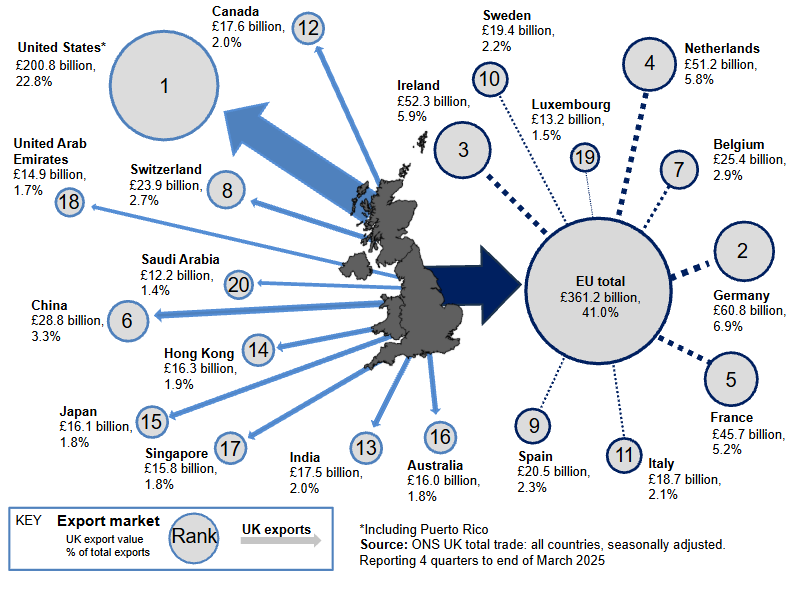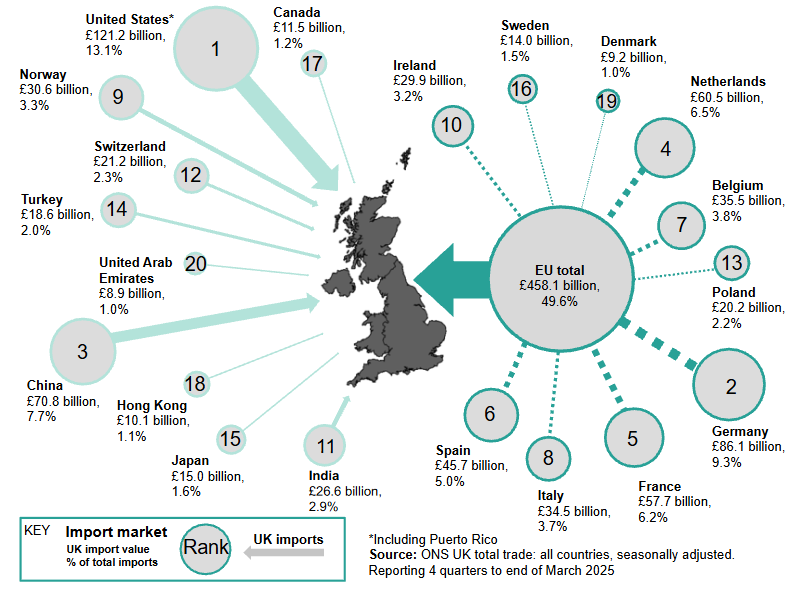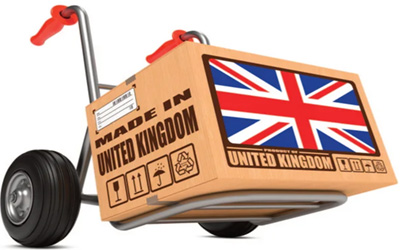UK Trade Strategy Vital Business Secrets
The UK trade strategy unveiled in June 2025 marks a pivotal transformation for British businesses navigating global markets. This comprehensive UK trade strategy promises to reshape how freight forwarders, importers, and exporters operate across international supply chains. For small and medium enterprises seeking to expand their global reach, understanding these strategic shifts becomes essential for sustainable growth.
At SARR Logistics UK, we recognise that this UK trade strategy represents more than policy changes it signals a fundamental reimagining of Britain’s position in worldwide commerce. The government’s ambitious vision to revitalise goods trade comes at a critical juncture when businesses need clarity, efficiency, and expert guidance to navigate increasingly complex international markets.
Strategic Foundation of the New UK Trade Strategy
The government’s latest UK trade strategy addresses longstanding challenges that have hindered British goods exports since Brexit. Unlike previous approaches that primarily supported service exports, this logistics strategy prioritises manufacturing competitiveness and infrastructure investment. The strategy acknowledges that goods exports have struggled significantly, requiring targeted intervention to restore Britain’s manufacturing prowess.
Central to this UK government trade initiative is the recognition that effective logistics infrastructure underpins successful international commerce. By investing in advanced border technologies and streamlined processes, the government aims to reduce friction that has historically deterred businesses from pursuing global opportunities. This strategic approach particularly benefits SMEs who previously found international trade prohibitively complex.
The UK trade strategy explicitly targets export diversification, encouraging businesses to explore markets beyond traditional European partnerships. This shift necessitates sophisticated logistics planning and expert freight forwarding support, particularly for businesses unfamiliar with diverse regulatory environments and cultural considerations across global markets.
Technology Revolution Transforming Border Operations
 Revolutionary technological upgrades form the cornerstone of the UK government trade modernisation efforts. The proposed Single Trade Window represents a game changing advancement that will consolidate multiple regulatory processes into one streamlined digital platform. This logistics strategy component promises to eliminate duplicate data entry and reduce processing delays that currently frustrate importers and exporters.
Revolutionary technological upgrades form the cornerstone of the UK government trade modernisation efforts. The proposed Single Trade Window represents a game changing advancement that will consolidate multiple regulatory processes into one streamlined digital platform. This logistics strategy component promises to eliminate duplicate data entry and reduce processing delays that currently frustrate importers and exporters.
Enhanced Customs Declaration Service improvements will provide real time tracking and automated compliance checking. These technological advances directly support the UK trade strategy’s efficiency objectives whilst reducing administrative burden on businesses. For SMEs particularly, simplified digital processes remove traditional barriers that prevented smaller companies from competing internationally.
The integration of artificial intelligence and machine learning into border operations will enable predictive analytics for cargo processing. This advanced logistics strategy ensures faster clearance times and improved security screening, benefiting businesses that require reliable shipping schedules for time sensitive deliveries.
Brexit Impact Analysis and Market Realignment
Brexit’s influence on UK trade patterns reveals the urgent need for the current UK trade strategy. Between 2021 and 2023, dramatic shifts occurred in trading relationships that fundamentally altered logistics requirements.
UK exports to EU countries declined by over 25%, whilst imports fell by nearly one third, creating significant disruptions for established supply chains.
Export diversity narrowed considerably as businesses struggled to maintain European market access. Many UK firms redirected efforts towards non EU markets, with the United States emerging as Britain’s largest export destination by 2024, overtaking Germany and Ireland. This realignment demonstrates the UK government trade strategy’s importance in supporting businesses through transition periods.
The proportion of goods in total UK exports reached historic lows at just 40%, highlighting the need for targeted manufacturing support. This UK trade strategy addresses these structural weaknesses through strategic investment in production capabilities and logistics infrastructure that supports goods movement efficiently.
UK Export markets for goods & services in the 4 quarters to the end of March 2025

UK Imports markets for goods & services in the 4 quarters to the end of March 2025

Opportunities for SMEs in Global Trade Expansion
Small and medium enterprises stand to benefit significantly from the UK trade strategy’s focus on reducing international trade complexity. Enhanced customs clearance processes will enable smaller businesses to compete with larger corporations that previously enjoyed economies of scale in regulatory compliance. This levelling effect opens new markets for innovative UK products.
The government’s logistics strategy includes dedicated support programmes for SMEs seeking to establish international partnerships. Training initiatives, digital tools, and simplified documentation requirements remove traditional barriers that prevented smaller companies from pursuing global opportunities. Expert guidance becomes readily available through enhanced trade support services.
Professional standards development for customs intermediaries ensures that SMEs receive consistent, high quality support when navigating international regulations. This standardisation builds confidence amongst smaller businesses that previously hesitated to engage with complex freight forwarding requirements.
The UK government trade approach prioritises accessibility for businesses of all sizes.
SARR Logistics a Strategic Partner for Global Success
 Understanding the implications of the UK trade strategy requires expertise across multiple freight forwarding disciplines. At SARR Logistics UK, our comprehensive service portfolio positions us ideally to support businesses capitalising on these strategic opportunities. Our sea freight expertise ensures cost effective solutions for businesses expanding into distant markets, whilst our air freight services provide time critical delivery options.
Understanding the implications of the UK trade strategy requires expertise across multiple freight forwarding disciplines. At SARR Logistics UK, our comprehensive service portfolio positions us ideally to support businesses capitalising on these strategic opportunities. Our sea freight expertise ensures cost effective solutions for businesses expanding into distant markets, whilst our air freight services provide time critical delivery options.
Our customs clearance specialists stay current with evolving regulations and digital platform developments. As the UK government trade initiatives introduce new technological systems, our team ensures seamless integration for your business operations. From documentation preparation to compliance verification, we handle complex requirements whilst you focus on core business activities.
Strategic warehousing facilities near major UK ports including Felixstowe, Tilbury, Southampton, Liverpool and London Gateway provide operational advantages as trade volumes increase. Our positioning supports the UK trade strategy’s infrastructure goals whilst offering practical benefits for businesses requiring flexible storage solutions.
For businesses exploring the UK trade statistics and performance data, our expertise in market analysis helps interpret complex data into actionable logistics strategies. We understand how regulatory changes affect supply chain planning and provide guidance that aligns with government initiatives.
Strategic Implementation for Maximum Impact
Successful implementation of logistics strategy aligned with government objectives requires careful planning and expert execution. Businesses must evaluate their current supply chain capabilities against emerging opportunities whilst ensuring compliance with evolving regulatory requirements. This assessment process identifies areas requiring immediate attention and long term strategic development.
The UK government trade strategy emphasises relationship building with international partners, necessitating reliable logistics support that maintains service quality across diverse markets. Cultural awareness, regulatory expertise, and flexible service delivery become critical success factors for businesses pursuing global expansion opportunities.
Competitive advantage emerges for businesses that rapidly adapt to the UK trade strategy’s technological innovations. Early adoption of digital platforms, automated compliance systems, and enhanced tracking capabilities positions companies favourably against competitors who hesitate to embrace change. Strategic planning ensures maximum benefit from government initiatives.
Long Term Success Through Strategic Partnerships
![]()
Contact our experienced team at [email protected] or call 0333 224 1 224 to discuss how we can support your international trade requirements. From road freight to rail freight solutions, SARR Logistics delivers the expertise and attention to detail your business requires to capitalise on the UK trade strategy opportunities.
Our project cargo capabilities ensure that businesses with specialised shipping requirements receive tailored solutions that align with government trade initiatives. Whether you’re expanding manufacturing capabilities or pursuing new international partnerships, our comprehensive logistics services provide the foundation for sustainable growth.
Conclusion:
The UK trade strategy represents a transformational opportunity for businesses ready to embrace global commerce. With government support reducing regulatory complexity and technological advancement streamlining operations, SMEs can compete effectively in international markets. Strategic logistics partnerships become essential for businesses seeking to maximise these opportunities whilst maintaining operational efficiency.
Success requires expert guidance, reliable service delivery, and deep understanding of evolving trade requirements. As the UK government trade initiatives develop, businesses that establish strong logistics foundations will capture the greatest competitive advantage in expanding global markets.
FAQ
How will the UK trade strategy affect my shipping costs?
The UK trade strategy aims to reduce shipping costs through streamlined border processes, digital documentation systems, and enhanced infrastructure. Businesses should experience lower administrative expenses and faster processing times, though individual cost impacts depend on specific trade routes and cargo types.
When will the Single Trade Window be available for businesses?
Whilst the UK government trade strategy outlines the Single Trade Window development, specific implementation timelines remain under consultation. Businesses should prepare for gradual rollout over the coming months, with pilot programmes likely preceding full deployment across all trade corridors.
What support is available for SMEs under the new logistics strategy?
The logistics strategy includes dedicated SME support programmes featuring training initiatives, simplified documentation, and enhanced trade support services. Government resources will provide guidance on international market entry, regulatory compliance, and digital platform utilisation specifically designed for smaller businesses.
How does the UK trade strategy impact customs clearance requirements?
Enhanced customs systems will automate compliance checking and provide real time tracking capabilities. Whilst requirements remain stringent, digital processes will simplify documentation submission and reduce processing delays. Professional customs support becomes increasingly valuable as systems evolve.
Which international markets offer the best opportunities UK trade strategy?
The UK government trade approach encourages diversification beyond EU markets, with particular emphasis on Asia Pacific, North America, and emerging economies. Market selection should consider your industry sector, product characteristics, and logistical requirements rather than pursuing opportunities based solely on strategy recommendations.









